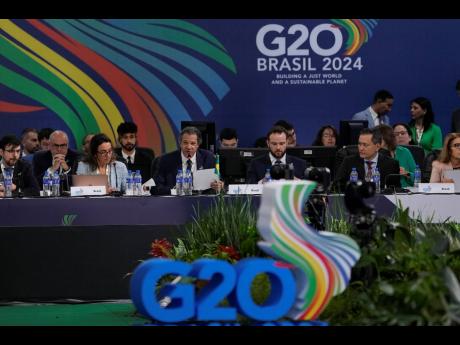Gabriel Zucman | Taxing the world’s super-rich is more possible
A mere 3,000 people have amassed US$14.4 trillion in wealth, the equivalent of 13 per cent of the world’s GDP. While the world’s billionaires controlled less than three per cent of global GDP in 1993, the growth of their wealth and political influence has since accelerated.
Regardless of nationality, the world’s ultra-rich share two striking similarities: the vast majority are men; and they typically pay much less tax, as a share of their income, than their employees and middle-class workers in general. The concentration of wealth is thus a global issue, one so alarming that the G20 – the group comprising the world’s largest developed and emerging economies – formally addressed it last month.
As G20 finance ministers put it in the final declaration at their conference in Rio de Janeiro on July 25-26:
It is important for all taxpayers, including ultra-high-net-worth individuals, to contribute their fair share in taxes. Aggressive tax avoidance or tax evasion of ultra-high-net-worth individuals can undermine the fairness of tax systems […]. Promoting effective, fair, and progressive tax policies remains a significant challenge that international tax cooperation and targeted domestic reforms could help address.
Fiscal equity underpins democracy. Without sufficient tax revenues, governments cannot guarantee adequate services such as education, health care, and social protection, nor can they respond to much larger problems like the climate crisis, which is already destabilising many countries around the world. Given the dire consequences of inaction in these areas, it is imperative that the wealthiest pay their fair share of taxes.
The Rio Declaration is an important milestone. For the first time since the G20 was established in 1999, all members agreed that the way the super-rich are taxed must be fixed, and they committed to doing it. But this consensus did not come out of nowhere. Advocates of tax fairness covered much ground in the months leading up to the summit.
Brazil occupies the G20’s rotating presidency this year, and in late February, the country’s finance minister, Fernando Haddad, invited me to speak at a high-level meeting in São Paulo. I was commissioned to write a report on tax fairness and taxation of the super-rich, the focus of my work as the founder and director of the EU Tax Observatory in Paris, which I submitted in late June, to inform the July summit discussion.
In the report, A Blueprint for a Coordinated Minimum Effective Taxation Standard for Ultra-High-Net-Worth Individuals, I advanced a proposal for a new effective taxation standard that includes a coordinated minimum tax of 2.0 per cent of wealth for such individuals – the world’s 3,000 billionaires. This standard would not only generate significant revenue – around US$200 billion to US$250 billion per year; it would also correct the structural injustice of contemporary tax systems, whereby billionaires’ effective tax rates are lower than for middle-class individuals.
The global public overwhelmingly supports fair taxation of the ultra-rich. According to an Ipsos poll in G20 countries, released in June, 67 per cent of people agree that there is too much economic inequality, and 70 per cent support the principle that wealthy people should pay higher income tax rates.
The Rio Declaration signals a significant shift: world leaders can no longer support a system in which the ultra-rich get away with paying less in taxes than the rest of us. Finance ministers have already agreed to important preliminary steps to improve tax transparency, enhance tax cooperation, and review harmful tax practices.
True, there was no political consensus to include the 2.0 per cent minimum tax on billionaires in the final text. The declaration had to be approved unanimously, and some countries still have reservations about some aspects of the proposal. For example, while US President Joe Biden’s administration supports a billionaire minimum tax domestically, it has been reluctant to advance the issue on the international stage.
But there is no going back. The minimum tax is now on the agenda, and looking at the history of international tax negotiations, there are concrete reasons to be optimistic about the proposal’s future. In 2013, the G20 acknowledged multinational companies’ rampant tax avoidance, giving political momentum to address the issue. Its initial action plan included improving tax transparency, enhancing tax cooperation, and reviewing harmful tax practices – the same wording now used in Rio. Then, in October 2021, 136 countries and territories (now 140) adopted a 15 per cent minimum corporate tax.
Fortunately, we do not need all countries to adopt a 2 per cent minimum tax on billionaires, or on centi-millionaires, if that is what policymakers decide. We simply need a critical mass of countries to agree on a set of rules to identify and value the wealth of the ultra-rich and to adopt instruments to impose effective taxation regardless of the billionaires’ tax residency. This way, we can avoid a scenario where the ultra-rich flee to fiscal havens, thus ending the race to the bottom among countries competing to offer billionaires the lowest tax rate.
Over the last ten years or so, international cooperation on taxation has improved significantly. The introduction of automatic exchanges of bank information, for example, has greatly reduced the possibility of tax avoidance. We already have the tools needed to make the world’s billionaires pay their fair share of taxes. It’s now up to the governments to act fast and effectively.
Gabriel Zucman, Professor of Economics at the Paris School of Economics and the University of California, Berkeley, is founding director of the EU Tax Observatory and a 2023 recipient of the American Economic Association’s John Bates Clark Medal.© Project Syndicate 2024www.project-syndicate.org


